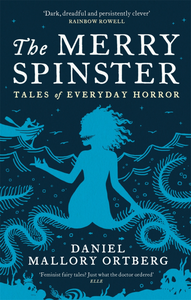Take a photo of a barcode or cover
**4.5 stars**
I find that there are thousands of versions of fairy tales retellings being published for today's readers, but Ortberg's versions are much more unique than anything else I've ever read. It's become a thing to explore the original macabre fairy tales written in the past. But The Merry Spinster is so much more than anything else I've read before.
Ortberg is funny, clever and witty, and all of this translates so extremely well into each of her stories. There are eleven stories in all, and if you only read one of them, let it be The Velveteen Rabbit. I was completely floored by this twisted version, which features a sociopathic stuffed rabbit hellbent on making all those who 'wrong' him pay, and wants to become 'real.'
There were so many amazing stories in this volume. These include a tale of mermaids who are concerned with property rights on land and a king who would murder all of his sons if he ever has a daughter. Many of the characters play interesting parts, especially in one where three daughters, one named Paul, consider playing the role of either husband or wife if they were to ever marry. Whether or not I completely understood each and every story (trust me - some of these went right over my head), they are amazingly well-written and contain plenty of horror and humor to go around.
I'm so glad I got a chance to read The Merry Spinster. It was completely satisfying and horrifying, full of questions and feminist critique that is sure to be thought-provoking for anyone. Ortberg manages to be clever and funny without poking fun on these original stories and their twisted endings. More than this, she highlights their originality while making them relevant for modern readers.
I find that there are thousands of versions of fairy tales retellings being published for today's readers, but Ortberg's versions are much more unique than anything else I've ever read. It's become a thing to explore the original macabre fairy tales written in the past. But The Merry Spinster is so much more than anything else I've read before.
Ortberg is funny, clever and witty, and all of this translates so extremely well into each of her stories. There are eleven stories in all, and if you only read one of them, let it be The Velveteen Rabbit. I was completely floored by this twisted version, which features a sociopathic stuffed rabbit hellbent on making all those who 'wrong' him pay, and wants to become 'real.'
There were so many amazing stories in this volume. These include a tale of mermaids who are concerned with property rights on land and a king who would murder all of his sons if he ever has a daughter. Many of the characters play interesting parts, especially in one where three daughters, one named Paul, consider playing the role of either husband or wife if they were to ever marry. Whether or not I completely understood each and every story (trust me - some of these went right over my head), they are amazingly well-written and contain plenty of horror and humor to go around.
I'm so glad I got a chance to read The Merry Spinster. It was completely satisfying and horrifying, full of questions and feminist critique that is sure to be thought-provoking for anyone. Ortberg manages to be clever and funny without poking fun on these original stories and their twisted endings. More than this, she highlights their originality while making them relevant for modern readers.
the best stories where: the six coffin boys, the rabbit and cast your bread upon the waters. like i wasn’t really invested in any of the stories and i wasn’t creeped out by any of them i was expecting more set in modern days also there was a lot of faith stuff and with the religious trauma i have i just didn’t gel all that well
Definitely creepy, but also not as good as I wanted it to be. Some stories just didn't make sense or left me wanting more.
Really disappointing. The two good stories were based on The Velveteen Rabbit and The Wind in the Willows. The stories based on fairy tales didn't have the same creepy element bc the original stories are already creepy and weird, so it felt more like a normal retelling.
Mallory Otberg was an author of the Toast and is the current Dear Prudence over at Slate. She has wonderful turns of phrase, and a caring, concise way of looking at the world. This short story collection is a literary spin on fairy tales (mostly Brothers Grimm) in her style.
The writing is fluid and elegant. She has a wonderful way of making language vibrant. Her imagery is saturated and the plots are immersive, sensory. The very lovely cover is an inkling of the kind of thing to come.
My major issue with these stories is how close they are, overall, to their source material. It's beautiful, and there are huge chunks of it that are SO GLORIOUSLY Mallory Ortberg's writing, but there are other parts that sound Like A Fairytale.
I wish she'd taken the fairytales farther. Messed with them more. She did some somewhat interesting things with gender, but never quite fleshed those out. She gender-swapped some characters, and had a scene where characters were deciding who was the husband and who was the wife, but those elements didn't solidify. There were so many opportunities here for something Really Effed Up to occur. I wanted things to happen that were so crazy that I would look back on this collection and say, "Ah, that was from Ms Ortberg's book" as opposed to being unable to remember what was from the original story and what was from this.
I clamor for MORE MALLORY IN MY MALLORY, I suppose. Which, if anything, is a decent criticism to receive. I think. I hope. Don't take this the wrong way, Mallory. I cherish you.
The writing is fluid and elegant. She has a wonderful way of making language vibrant. Her imagery is saturated and the plots are immersive, sensory. The very lovely cover is an inkling of the kind of thing to come.
My major issue with these stories is how close they are, overall, to their source material. It's beautiful, and there are huge chunks of it that are SO GLORIOUSLY Mallory Ortberg's writing, but there are other parts that sound Like A Fairytale.
I wish she'd taken the fairytales farther. Messed with them more. She did some somewhat interesting things with gender, but never quite fleshed those out. She gender-swapped some characters, and had a scene where characters were deciding who was the husband and who was the wife, but those elements didn't solidify. There were so many opportunities here for something Really Effed Up to occur. I wanted things to happen that were so crazy that I would look back on this collection and say, "Ah, that was from Ms Ortberg's book" as opposed to being unable to remember what was from the original story and what was from this.
I clamor for MORE MALLORY IN MY MALLORY, I suppose. Which, if anything, is a decent criticism to receive. I think. I hope. Don't take this the wrong way, Mallory. I cherish you.
I’d been meaning to read these stories for a long time, and once I finally began I found it hard to put them down. What a delectable mélange, a stone-soup of old favorites and ancient stories in an ultra-contemporary voice, dark and chilling enough to make one want to cuddle up with a hot cup of something dangerous. Don’t wait as long as I did.
2.5 stars
My opinion of this collection is mixed. I enjoyed "The Six-Boy Coffins" (probably my overall favorite), "The Rabbit," and "The Daughter Cells," and "The Frog's Princess." "Fear Not," "The Merry Spinster," and "Cast Your Bread Upon the Waters" were well done but not my favorite, and the others were not great or didn't make sense.
I laughed at Ortberg's humor in a few stories, but over half of them seemed to just end without any real conclusion, making me feel like there was something that I didn't "get." Considering my college honors thesis was on fairy tales and folklore in modern pop culture, this doesn't often happen to me. I felt like oftentimes the author got so caught up in her own cleverness of adapting traditional tales that she forgot to make the stories have a point. The gender fluidity threw me a little the first time it came up (I think it was in "Thankless Child"), but after that it quickly made sense for characters to fill roles like husband or wife, or daughter or son based on skill sets rather than gender so I actually kind of liked that feature, especially for fairy tales.
My opinion of this collection is mixed. I enjoyed "The Six-Boy Coffins" (probably my overall favorite), "The Rabbit," and "The Daughter Cells," and "The Frog's Princess." "Fear Not," "The Merry Spinster," and "Cast Your Bread Upon the Waters" were well done but not my favorite, and the others were not great or didn't make sense.
I laughed at Ortberg's humor in a few stories, but over half of them seemed to just end without any real conclusion, making me feel like there was something that I didn't "get." Considering my college honors thesis was on fairy tales and folklore in modern pop culture, this doesn't often happen to me. I felt like oftentimes the author got so caught up in her own cleverness of adapting traditional tales that she forgot to make the stories have a point. The gender fluidity threw me a little the first time it came up (I think it was in "Thankless Child"), but after that it quickly made sense for characters to fill roles like husband or wife, or daughter or son based on skill sets rather than gender so I actually kind of liked that feature, especially for fairy tales.
I actually didn't mind the little mermaid retelling and I liked the velveteen rabbit retelling. The rest though. Infuriating. Most of them ended without ending, the themes were awful, the stories themselves made little sense, and the writing was sub par. I can't believe how much I hated reading this.
I guess I didn't get what was so magical about it.
Some of the stories had interesting premises, or were even very well written, but ultimately they just went nowhere. I guess the author's inspiration was old folktales, but even those had a point, a moral, something. Most of the stories here were just interesting premises amounting to nothing.
Some of the stories had interesting premises, or were even very well written, but ultimately they just went nowhere. I guess the author's inspiration was old folktales, but even those had a point, a moral, something. Most of the stories here were just interesting premises amounting to nothing.





